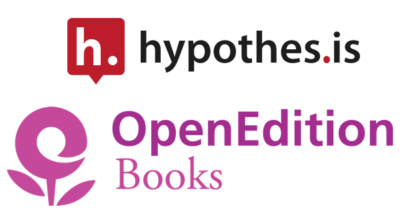Open Annotations: OpenEdition Launches a Partnership with Hypothesis
 As part of the European HIRMEOS project, OpenEdition, the project coordinator, is launching a post-publication open peer review experiment. At the heart of the project is Hypothesis, an annotation tool that will initiate a new form of scientific discussion around social science and humanities monographs published on the platform OpenEdition Books.
As part of the European HIRMEOS project, OpenEdition, the project coordinator, is launching a post-publication open peer review experiment. At the heart of the project is Hypothesis, an annotation tool that will initiate a new form of scientific discussion around social science and humanities monographs published on the platform OpenEdition Books.
Two types of annotation are therefore available on OpenEdition Books:
- The classic version of Hypothesis is already integrated on OpenEdition Books (available for publishers who wish to activate it) and on the four other platforms participating in the HIRMEOS project (Ubiquity Press, The OAPEN Library, EKT e-publishing, Göttingen University Press). Thanks to it, Hypothesis will be able to be visible by default on publisher books, offering readers the possibility to write personal notes, create collaboration groups, or share public comments.
- At the same time, OpenEdition is coordinating an experiment with open annotations. Publishers and authors who wish to go further in the use of annotations will benefit from customized settings within this framework thanks to the functionality of publisher groups, a newer Hypothesis capability used in this case for open peer review.
In the case of experimentation, researchers will be able to compare and contrast their ideas and enrich publications thanks to a line-by-line text commenting system. During the experiment, selected books will become an open forum for discussion between authors and readers: this will offer an opportunity to mobilize a scientific community around a recent publication, or to revive the debate around and interest in older publications.
The experiment will last until May 2019. Throughout the project, OpenEdition will support the actors involved by forming groups of contributors (the composition of which will depend on the selected books) — the cornerstone of the experiment — or by helping publishers to gain experience with the tool. At the end of the experiment, a report will be written and the functionality should be available on all books by publishers who wish to use it.
The partnership between OpenEdition and Hypothesis is based on the use of the publisher group feature developed by Hypothesis. With this feature, OpenEdition can request the creation of customizable and moderated annotation spaces (publisher groups) for each publisher participating in the experiment. The layers of annotations created can be totally open (anyone can view and leave annotations) or restricted (anyone can view annotations, but people must be invited to leave annotations). Each publisher will have a tailored annotation space (showing its name and logo). The open peer review experiment will take place within these publisher groups.
To learn more about integrating collaborative annotation with your publications, contact us and subscribe to news from Hypothesis.
About HIRMEOS
HIRMEOS (High Integration of Research Monographs in European Open Science) is a European project aimed at enriching five humanities and social science publishing platforms (OpenEdition Books, Ubiquity Press, The OAPEN Library, EKT e-publishing, Göttingen University Press). The project is focused on the coordinated integration of five types of services including: identification standards (ORCID, DOIs, Funder Registry), a peer review certification service (DOAB), a semi-automatic indexing functionality (NERD), and a statistics service. The fifth service is online annotations. HIRMEOS is a strand of the H2020 programme and is part of the construction of the OPERAS infrastructure.
About OpenEdition
OpenEdition (CNRS / Aix-Marseille University / EHESS / Avignon University) is a national research infrastructure whose mission is to promote open electronic publishing. Consisting of four platforms for publishing books, journals, research journals and scientific announcements, the OpenEdition portal is currently home to more than 700,000 humanities and social science publications in various languages, most of which are in open access, and receives over 50 million hits per year around the world. The OpenEdition Books platform currently contains over 6,000 references from more than 80 publishers.
Contacts
OpenEdition: Claire Dandieu, Project Editor

